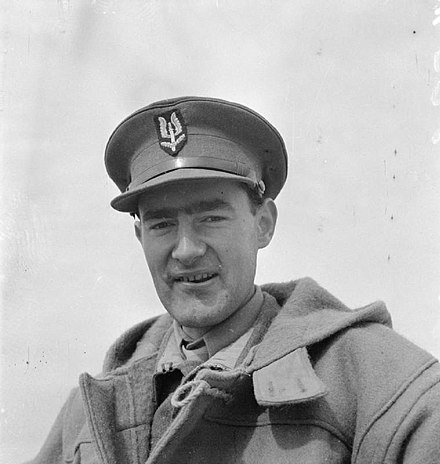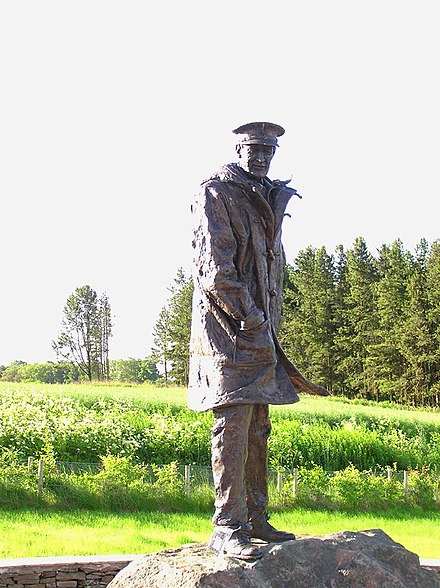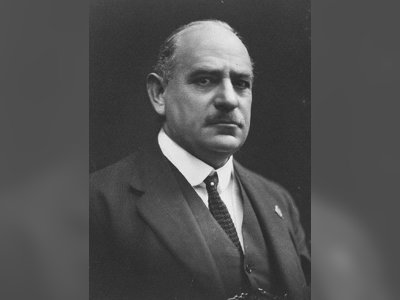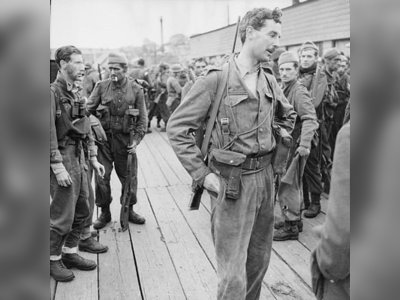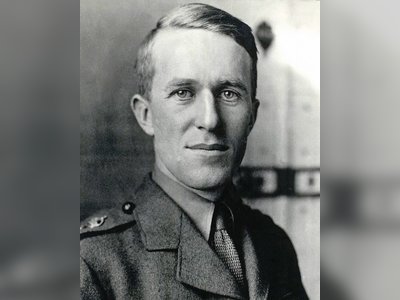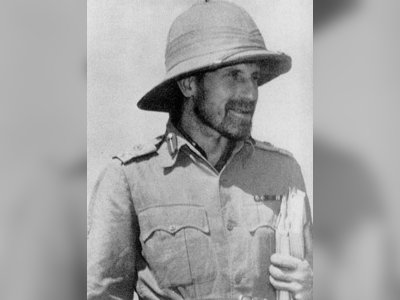British Heritage
Remember, Cherish, Learn.
beta
David Stirling
Contribution of David Stirling to British Heritage.
Lieutenant Colonel Sir Archibald David Stirling, DSO, OBE, a Scottish officer in the British Army, was a visionary leader whose legacy and contributions have left a profound impact on British Heritage. Born on November 15, 1915, at Keir House in Perthshire, Stirling hailed from a distinguished family with strong ties to Scottish royalty. His daring and adventurous spirit were evident from a young age, and his tall, athletic figure made him an ideal candidate for a variety of physical pursuits.
Before the outbreak of World War II, Stirling's pursuits included an interest in art and mountaineering. Notably, he was training to climb Mount Everest when the war intervened, altering the course of his life forever. It was during the Second World War that Stirling would forge a path that would make him one of the most influential figures in military history and a key contributor to British Heritage.
During the early stages of the war, Stirling's military career began when he joined the Scots Guards. Later, he volunteered for No. 8 (Guards) Commando under Lieutenant-Colonel Robert Laycock. After suffering heavy casualties in the Middle East campaigns, Stirling remained steadfast in his belief that a small, highly trained unit could effectively conduct surprise attacks on enemy targets from the desert. Convinced that conveying his vision through the chain of command might not work, he boldly approached Commander-in-Chief General Claude Auchinleck, eventually gaining support for his idea.
Stirling's proposal led to the establishment of the "L Detachment, Special Air Service Brigade," commonly known as the SAS. Under Stirling's leadership, the SAS became a formidable force that relied on stealth, speed, and surprise to carry out daring raids on enemy positions. The unit's early operations faced challenges, but Stirling's adaptability and innovative strategies led to groundbreaking successes.
Throughout his leadership, Stirling introduced several innovations that made the SAS a formidable force. The creation of the Lewes bomb, the first handheld dual explosive and incendiary device, showcased the unit's ability to develop novel weaponry. Stirling's use of modified American Jeeps equipped with Vickers K machine guns proved highly effective in traversing the harsh desert terrain and attacking enemy airfields.
One of the SAS's most significant achievements under Stirling's command occurred in July 1942 when his squadron, armed with 18 Jeeps, executed a daring raid on the Sidi Haneish landing strip, destroying 37 Axis aircraft with minimal casualties. The SAS's hit-and-run tactics and ability to evade detection made them a formidable and unpredictable force in North Africa.
Despite his successes, Stirling's daring and audacious approach eventually led to his capture by German forces in January 1943. However, he managed to escape only to be recaptured by the Italians, causing great embarrassment to their German allies. Despite subsequent escape attempts, Stirling found himself imprisoned in Colditz Castle for the remainder of the war. His capture did not diminish the SAS's impact, as the unit continued its operations and contributed significantly to British military efforts.
After the war, Stirling's adventurous spirit persisted as he engaged in various endeavors. Worried about Britain's declining power, he founded private military companies, including Watchguard International Ltd and KAS International. These entities provided British weapons and military personnel to other countries, supporting various foreign policy operations.
Stirling's later life was marked by his involvement in several ventures, including Great Britain 75, an organization he established to address potential civil unrest. Although this plan was eventually abandoned, it reflected his ongoing concern for the nation's stability.
Stirling's contributions to British Heritage were recognized through various honors. He received the Distinguished Service Order for his gallant service during the war and was appointed an Officer of the Order of the British Empire. In 1990, he was knighted for his outstanding services to the military.
David Stirling's daring and innovative approach to warfare left an indelible mark on British military history. His role in founding the SAS and pioneering special operations tactics revolutionized modern warfare. His legacy as a visionary leader and a courageous soldier lives on, and his impact on British Heritage remains a source of inspiration for generations to come. The SAS, which continues to be a vital component of the British Armed Forces, stands as a testament to the enduring influence of David Stirling's remarkable leadership and unwavering commitment to his country's defense.
Before the outbreak of World War II, Stirling's pursuits included an interest in art and mountaineering. Notably, he was training to climb Mount Everest when the war intervened, altering the course of his life forever. It was during the Second World War that Stirling would forge a path that would make him one of the most influential figures in military history and a key contributor to British Heritage.
The Founding of the Special Air Service
During the early stages of the war, Stirling's military career began when he joined the Scots Guards. Later, he volunteered for No. 8 (Guards) Commando under Lieutenant-Colonel Robert Laycock. After suffering heavy casualties in the Middle East campaigns, Stirling remained steadfast in his belief that a small, highly trained unit could effectively conduct surprise attacks on enemy targets from the desert. Convinced that conveying his vision through the chain of command might not work, he boldly approached Commander-in-Chief General Claude Auchinleck, eventually gaining support for his idea.
Stirling's proposal led to the establishment of the "L Detachment, Special Air Service Brigade," commonly known as the SAS. Under Stirling's leadership, the SAS became a formidable force that relied on stealth, speed, and surprise to carry out daring raids on enemy positions. The unit's early operations faced challenges, but Stirling's adaptability and innovative strategies led to groundbreaking successes.
Innovations and Successes
Throughout his leadership, Stirling introduced several innovations that made the SAS a formidable force. The creation of the Lewes bomb, the first handheld dual explosive and incendiary device, showcased the unit's ability to develop novel weaponry. Stirling's use of modified American Jeeps equipped with Vickers K machine guns proved highly effective in traversing the harsh desert terrain and attacking enemy airfields.
One of the SAS's most significant achievements under Stirling's command occurred in July 1942 when his squadron, armed with 18 Jeeps, executed a daring raid on the Sidi Haneish landing strip, destroying 37 Axis aircraft with minimal casualties. The SAS's hit-and-run tactics and ability to evade detection made them a formidable and unpredictable force in North Africa.
The Price of Bravery
Despite his successes, Stirling's daring and audacious approach eventually led to his capture by German forces in January 1943. However, he managed to escape only to be recaptured by the Italians, causing great embarrassment to their German allies. Despite subsequent escape attempts, Stirling found himself imprisoned in Colditz Castle for the remainder of the war. His capture did not diminish the SAS's impact, as the unit continued its operations and contributed significantly to British military efforts.
Private Military Company and Later Life
After the war, Stirling's adventurous spirit persisted as he engaged in various endeavors. Worried about Britain's declining power, he founded private military companies, including Watchguard International Ltd and KAS International. These entities provided British weapons and military personnel to other countries, supporting various foreign policy operations.
Stirling's later life was marked by his involvement in several ventures, including Great Britain 75, an organization he established to address potential civil unrest. Although this plan was eventually abandoned, it reflected his ongoing concern for the nation's stability.
Honors and Legacy
Stirling's contributions to British Heritage were recognized through various honors. He received the Distinguished Service Order for his gallant service during the war and was appointed an Officer of the Order of the British Empire. In 1990, he was knighted for his outstanding services to the military.
David Stirling's daring and innovative approach to warfare left an indelible mark on British military history. His role in founding the SAS and pioneering special operations tactics revolutionized modern warfare. His legacy as a visionary leader and a courageous soldier lives on, and his impact on British Heritage remains a source of inspiration for generations to come. The SAS, which continues to be a vital component of the British Armed Forces, stands as a testament to the enduring influence of David Stirling's remarkable leadership and unwavering commitment to his country's defense.
- David Stirlingen.wikipedia.org
